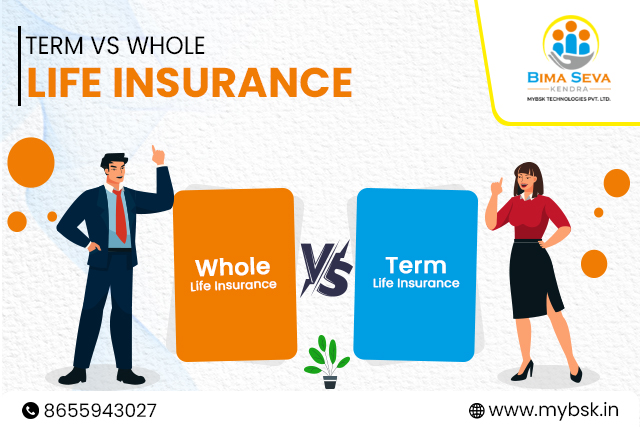
“ सेवा, सुरक्षा और समाधान ”

TERM VS WHOLE Life Insurance
Hello there! Confused between Term and Whole Life Insurance? Here is some advice from subject matter experts to end that confusion here. Today, let's unravel the mystery behind Term Insurance and Whole Life Insurance in simple terms so you can make a decision that fits your life like a dream.
1. Overview
Two primary types of life insurance policies that individuals consider are Term Insurance and Whole Life Insurance. Both serve distinct purposes and come with their set of advantages and disadvantages. Below mentioned are the details, pros and cons of both.
2. Term Life Insurance
Term Life Insurance provides coverage for a specified ‘term’ or period. If anything unfortunate happens to the insured person during the policy’s term, a death benefit would be reimbursed to beneficiaries. However, if the insured lives through the policy’s term, there is no death benefit payout.
3. Whole Life Insurance Whole Life Insurance covers you for, you guessed it right, the entire lifetime of the insured
person. If all the premiums are paid, the policy will remain active, and a death benefit will be guaranteed to be paid to the beneficiaries if the insured passes away. Additionally, these policies have a cash value component that grows with time. Policyholders can access this value via loans or withdrawals.
4. Comparison
| S. No. | TERM LIFE INSURANCE | WHOLE LIFE INSURANCE |
| 1 | Lower costs than most life insurances by a wide margin. | Costs are higher as compared to other policies. |
| 2 | Easier to understand, less complex. | More complicated to understand. |
| 3 | Has low premiums initially that increase with each renewal. | Premiums remain fixed and don't increase. |
| 4 | Protection lasts only for a limited period. | Protection for a lifetime. (as long as premiums are paid.) |
| 5 | Not beneficial in wealth-building\tax-planning strategies. | Loans and withdrawals are typically tax-free. |
| 6 | Ideal for people seeking short-term insurance giving good coverage. | Ideal for people looking for long-term insurance plus an investment. |
| 7 | The death benefit is given if the insured dies during the term. | The death benefit is guaranteed, though outstanding loans can reduce it. |
| 8 | Has no cash value. | Does have a cash value. |
5. Which one to choose
Given the pros and cons of both, none is better than the other. The right choice between whole life and term life insurance depends on individual financial goals, preferences, and the duration of coverage needed.
Term insurance is better if you are looking for -
● Affordable coverage for a certain duration.
● A lower premium and higher death benefit.
● investing the money elsewhere and not interested in accumulating a cash value.
● saving for different financial goals.
● Simplicity
Whole Life Insurance is better if -
● Higher premiums are not an issue.
● You want a guaranteed death benefit for beneficiaries.
● You have someone dependent on you.
● The goal is inheritance or estate planning.
● You want a cash value accumulation as a savings or investment component.
Conclusion
Remember, consulting with a subject matter expert is a prudent step to ensure a swift claim settlement, avoiding claim rejections or other insurance claim-related issues and determining if your decision aligns with your overall financial plan.
© 2026 MYBSK All Rights Reserved. Designed By SKALY INFOTECH PVT.LTD.
